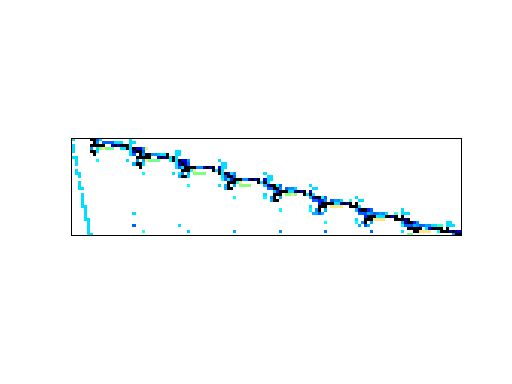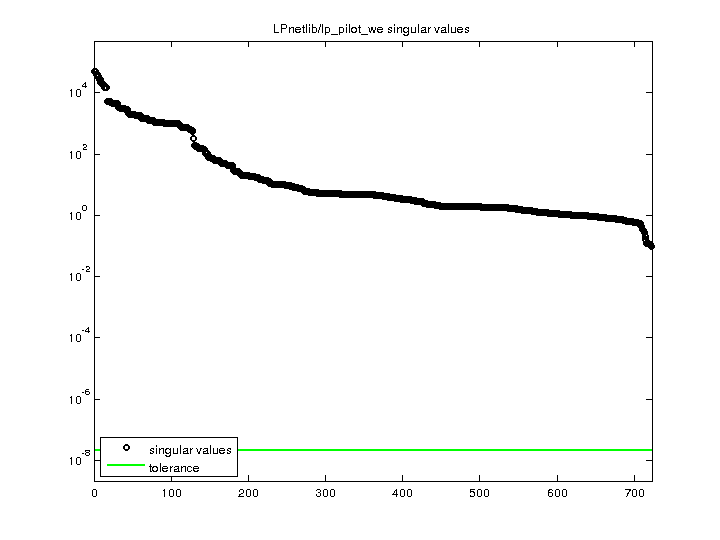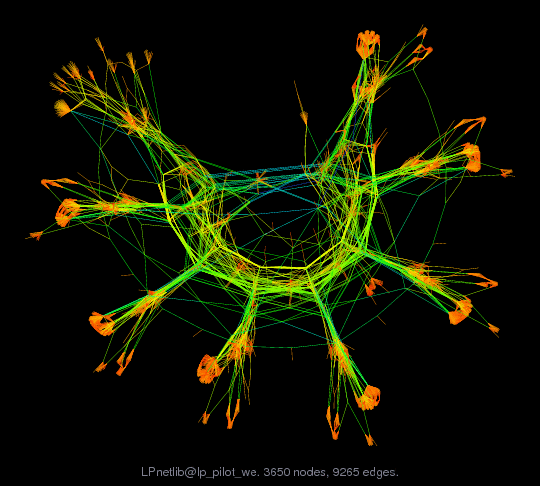LPnetlib/lp_pilot_we
Netlib LP problem pilot_we: minimize c'*x, where Ax=b, lo<=x<=hi
| Name |
lp_pilot_we |
| Group |
LPnetlib |
| Matrix ID |
658 |
|
Num Rows
|
722 |
|
Num Cols
|
2,928 |
|
Nonzeros
|
9,265 |
|
Pattern Entries
|
9,265 |
|
Kind
|
Linear Programming Problem |
|
Symmetric
|
No |
|
Date
|
|
|
Author
|
Stanford |
|
Editor
|
R. Fourer |
| Structural Rank |
722 |
| Structural Rank Full |
true |
|
Num Dmperm Blocks
|
1 |
|
Strongly Connect Components
|
1 |
|
Num Explicit Zeros
|
0 |
|
Pattern Symmetry
|
0% |
|
Numeric Symmetry
|
0% |
|
Cholesky Candidate
|
no |
|
Positive Definite
|
no |
|
Type
|
real |
| SVD Statistics |
| Matrix Norm |
4.875754e+04 |
| Minimum Singular Value |
9.240439e-02 |
| Condition Number |
5.276540e+05
|
| Rank |
722 |
| sprank(A)-rank(A) |
0 |
| Null Space Dimension |
0 |
| Full Numerical Rank? |
yes |
| Download Singular Values |
MATLAB
|
| Download |
MATLAB
Rutherford Boeing
Matrix Market
|
| Notes |
A Netlib LP problem, in lp/data. For more information
send email to netlib@ornl.gov with the message:
send index from lp
send readme from lp/data
The following are relevant excerpts from lp/data/readme (by David M. Gay):
The column and nonzero counts in the PROBLEM SUMMARY TABLE below exclude
slack and surplus columns and the right-hand side vector, but include
the cost row. We have omitted other free rows and all but the first
right-hand side vector, as noted below. The byte count is for the
MPS compressed file; it includes a newline character at the end of each
line. These files start with a blank initial line intended to prevent
mail programs from discarding any of the data. The BR column indicates
whether a problem has bounds or ranges: B stands for "has bounds", R
for "has ranges". The BOUND-TYPE TABLE below shows the bound types
present in those problems that have bounds.
The optimal value is from MINOS version 5.3 (of Sept. 1988)
running on a VAX with default options.
PROBLEM SUMMARY TABLE
Name Rows Cols Nonzeros Bytes BR Optimal Value
PILOT.WE 723 2789 9218 79972 B -2.7201027439E+06
BOUND-TYPE TABLE
PILOT.WE UP LO FX FR
Supplied by Bob Fourer.
When included in Netlib: Cost coefficients negated.
Bob Bixby reports that the CPLEX solver (running on a Sparc station)
finds slightly different optimal values for some of the problems.
On a MIPS processor, MINOS version 5.3 (with crash and scaling of
December 1989) also finds different optimal values for some of the
problems. The following table shows the values that differ from those
shown above. (Whether CPLEX finds different values on the recently
added problems remains to be seen.)
Problem CPLEX(Sparc) MINOS(MIPS)
PILOT.WE -2.7201075328E+06 -2.7201042967E+06
Source for PILOT.JA, PILOT.WE, PILOT4, PILOTNOV: Systems Optimization
Laboratory, Stanford University.
|


